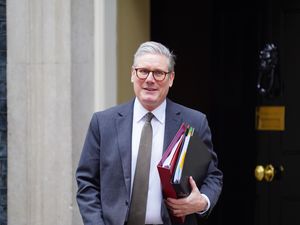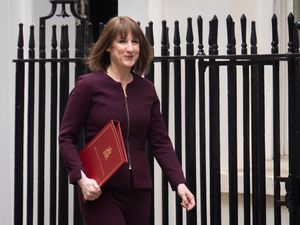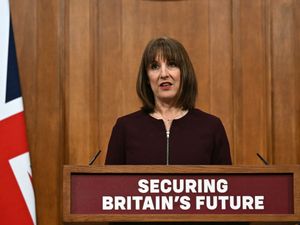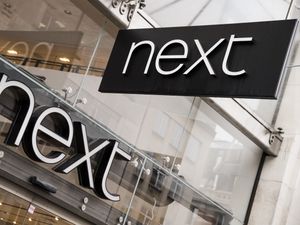UK not planning retaliatory tariffs on US ‘at the moment’, says Chancellor
President Donald Trump has announced a 25% tariff on vehicles imported to the US will come into effect on April 2.
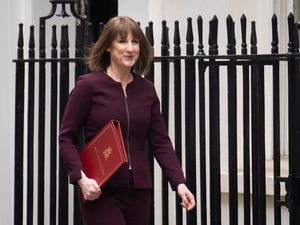
The UK is not planning “at the moment” to introduce retaliatory tariffs on the US, Chancellor Rachel Reeves has said after Donald Trump imposed a new trade tax on car imports.
A 25% tariff on vehicles imported to the US will come into effect on April 2, the US president announced on Wednesday.
Shares in carmaker Aston Martin dropped sharply when stock markets opened on Thursday morning.
The firm, which is listed on the London Stock Exchange, saw its share price fall about 6% shortly after opening.
Ms Reeves told Sky News: “We’re not at the moment at a position where we want to do anything to escalate these trade wars.
“Trade wars are no good for anyone. It will end up with higher prices for consumers, pushing up inflation after we’ve worked so hard to get a grip of inflation, and at the same time will make it harder for British companies to export.
“We are looking to secure a better trading relationship with the United States. I recognise that the week ahead is important. There are further talks going on today, so let’s see where we get to in the next few days.”
In an interview with Times Radio, the Chancellor said free trade is “good for both of our countries”.
She added: “A million British people work for American firms. A million Americans work for British firms. Our two economies are so closely intertwined.”
Shadow chancellor Mel Stride said it is “very important” the UK has a trade deal with the US “that means we are protected from those tariffs”.
He told ITV’s Good Morning Britain: “I think it’s a balance between we want to make sure that we have the right relationship with America on all sorts of levels, including security as well as economic, in order to make sure we get the very best for our country.”
The Liberal Democrats called on the Government to “toughen up” and start placing retaliatory tariffs on US carmakers like Tesla.
The party’s deputy leader Daisy Cooper told BBC Radio 4’s Today programme: “The Government strategy so far seems to be to cower in the corner and just ask Donald Trump to be nice to us, and just to hope that he doesn’t do anything nasty.”
The import tax on cars is on top of a series of reciprocal tariffs set to come into effect on April 2, which could include a general 20% levy on UK products in response to the rate of VAT.
In its assessment of the UK economy, the budget watchdog warned a full-blown tariff war with the US could wipe 1% off gross domestic product next year and derail Ms Reeves’s hopes of balancing the books, forcing her to implement more cuts or tax hikes.
Office for Budget Responsibility chairman Richard Hughes told Today: “This represents the crystallisation of one of the risks that we highlighted around our central forecast, which was one of escalating global trade tensions.”
The “worst-case scenario” would come about if Mr Trump imposed 20% tariffs on British goods and the UK reciprocated in kind.

“The UK exports, in terms of goods to the US, around 2% of GDP,” Mr Hughes said. “Car exports are about 10% of that.
“So that’s affecting directly UK goods exports of around 0.2% of GDP. So what Trump’s announced overnight is not the whole of that worst-case scenario, but it’s elements of it, and it’s the beginning of that risk side.”
Around four out of five cars made in the UK are exported.
Figures from industry body the Society of Motor Manufacturers and Traders (SMMT) show the US is the second largest export market after the European Union for cars built in the UK.
Some 16.9% of UK car exports were to the US last year.
The BBC reported the US is the largest sales market for UK-based Jaguar Land Rover.
Last year the company sold 116,294 vehicles to the US, which exceeded its sales in the UK and China.
SMMT chief executive Mike Hawes said the announcement of tariffs was “not surprising but, nevertheless, disappointing” and he urged both governments to strike a deal that avoids further damage.
“If, as seems likely, additional tariffs are to apply to UK-made cars, it’s a blow to a long-standing and productive relationship,” he said.
The tariffs announced by the Trump administration could also create issues for US car firms.
Many source their components from across the globe – meaning they could be faced with higher prices.
At close of trading on Wednesday, shares in General Motors had fallen 3.1% while shares in Stellantis – the owner of Jeep and Chrysler – were 3.6% down.
Ford’s stock closed 0.1% higher.

